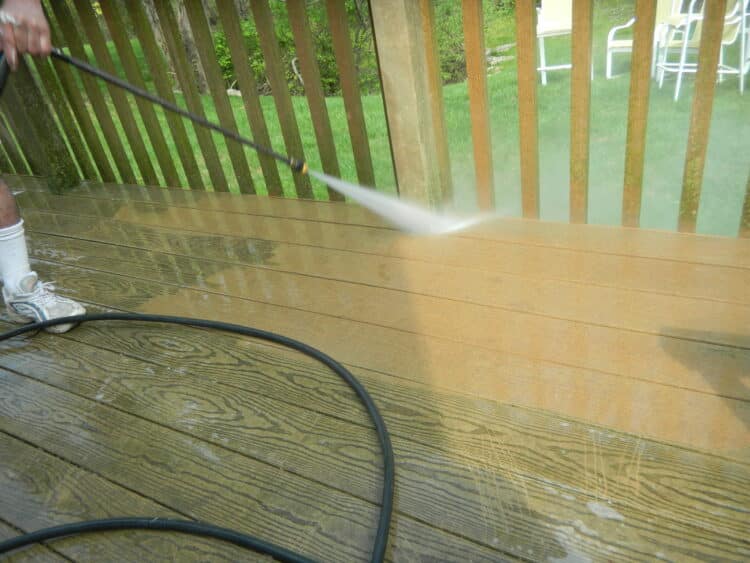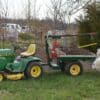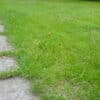
Power washing and pressure washing are terms that are often interchanged or used in replacement of the other. It’s understandable because they do seem similar at a glance.
But, there are key features in each that allow you to differentiate power washing vs. pressure washing
Table of Contents
What is power washing?
Power washing uses an intense pressure of very hot water to lean anything in your house—both indoor and outdoor.
It blasts away algae, mold, and dirt. When used outdoors, it does a better job of removing salt and mildew residues from decks, outdoor patios, and driveways.
The heat from a power washer also helps remove more stubborn residues such as chewing gum and grease stains.
Powerful blasts of hot water can help you maintain your driveway by killing weeds and moss that are growing around the path.
Below is a summary of all the things you can do with a power washer:
- Kill off weeds and algae
- Get rid of mold and mildew
- Clean sidings made out of wood, vinyl, and aluminum
- Clean gutters
- Removing gum from sidewalks
- Refreshing a patio or deck
- Keeping the house in tiptop shape for a sale
Power washers are best when you need a heavy-duty cleaning job. Surfaces that have become heavily saturated with dirt or other types of unwanted matter can be cleaned easily through the use of a power washer.
What is pressure washing?
Pressure washing is similar to power washing in that it uses intense pressure to do the job. Their main difference is that pressure washing uses water that normally comes from your taps—it doesn’t use hot water.
Another thing unique to a pressure washer is that it has a tank that uses either gas or electricity to apply pressure. Pressure can range from 1,300 psi to 2,800 psi.
Pressure washing can still do a great job compared to a power washer, but it just isn’t as effective on substances that are stuck to a surface such as mold and moss.
Power washing vs. pressure washing
Compared to power washing, pressure washing doesn’t do as good a job when it comes to cleaning stains on concrete.
If you need a tool for heavy-duty cleaning, then a power washer is the best option because it is effective in removing stains and substances on all surfaces.
The heated water from a power washer is best for use on concrete and cement because these are surfaces that can withstand it.
Basically, the main difference between power washing vs. pressure washing is the added element of hot or heated water.
A pressure washer uses water as it comes out of your taps while a power washer uses heated water, making it all the more effective.
What are the best uses for a pressure cleaner?
A pressure washer uses a high-pressure water spray that allows it to clean large surfaces in order to remove dust, dirt, grime, mud, salt, mold, and other stains.
It is best reserved for cleaning the following areas:
- Driveways, walkways, patios, stairways, and sidewalks
- Spaces that are open to the public such as parking garages, open air plazas, and stadiums
- The exteriors of residential and commercial buildings
- Cars, trucks, buses, boats, and other vehicles
Pressure cleaners work great in keeping a building in tiptop shape. It cleans up the area and gives it a brighter look.
The use of pressure cleaners is not limited to commercial and residential buildings. Homeowners can also benefit from the use of a pressure cleaner.
Should I use power washing or pressure washing?
Each one comes with its own uses, but power washing is best reserved for heavy-duty projects that involve large surfaces.
The heated water involved in power washing loosens dirt and other materials easily, making it ideal for commercial areas.
But this also means that they are not the best option when it comes to softer surfaces like wooden decks, bricks, and other types of masonry.
It is usually enough to use a pressure washer when you are only cleaning things up around your house. It is also less harsh compared to a power washer.
You can give your patio or deck a quick clean up without damaging them if you use a pressure washer.
What should you never pressure wash?
Despite its obvious benefits in cleaning things up around your home, there are some things that you should never pressure wash:
- Electrical meters and panels
- Air conditioners
- Old mortar
- Painted surfaces
- Living things
- Lead paint
- Asphalt shingles
- Wood sidings
For obvious reasons, do not try to use a pressure washer on anything that runs electricity—even in your outdoor outlets.
Most outdoor outlets are created to withstand moisture rainstorms and other forms of severe weather, but they were not made to withstand the intensity of a pressure washer.
Use a pressure washer on your electrical outlets can invite water into your electrical circuits and cost you a lot of money for repairs.
Plus, it presents the possibility of electrocution if any circuits are live. Cover up all electrical outlets and keep out of harm’s way all exposed wiring before you start pressure washing.
Pressure washers should not be used on AC units. There are delicate cooling fins in an air conditioning unit, and intense pressure could damage or dent them.
A vacuum is a better option when cleaning AC units or at the very least, using gentler water flows to clean out debris stuck in the cooling fins.
If you see any dents on your cooling fins, you can use a butter knife to straighten them back out.
Brick houses that are weathered with age are susceptible to damage caused by a pressure washer.
Should there be any loose mortar or material, a pressure washer can blast it away and cause more damage than before.
If you want a painted surface to remain painted, don’t turn a pressure washer on it. A pressure washer has the power to chip off paint from any surface so be sure to only use it if you want to remove the paint.
This applies to painted walls, floors, decks, and furniture. If you really need to use a pressure washer to clean a painted surface, adjust the pressure and keep it low.
The pressure applied by a pressure washer can be strong enough to cause physical harm. In extreme cases, it can even penetrate the skin and sever a toe or a finger.
Never turn your pressure washer on pets, plants, or humans. That is why you have to wear the appropriate safety equipment when using a pressure washer.
At the very least, wear safety googles to protect your eyes from flying debris.
Lead paint must be contained carefully after its removal. Using a pressure washer blasts it into the air and other surfaces, which in turn can lead to more contamination.
Intense water pressure can strip away protective granules that cover the asphalt shingles on your roof. There is also the added danger of wielding intense pressure while in a high place.
There is still a “trigger recoil” that could throw a person off balance once you switch on the washer. You could fall off the ladder or off the roof itself.
In most cases, you can get away with applying pressure cleaning to wood sidings, but you could also be forcing water up the surface of the wood.
This allows water to get inside the wood’s exterior and damage insulation, spur mold growth, and ruin electrical wiring if you use too much pressure.
You can also dent other sidings such as aluminum and vinyl if your pressure washer is set too high.
In order to avoid this problem, you need to learn the proper techniques first before using a pressure washer.
Tips for a safe and successful cleaning
You can either buy your own pressure washer, rent it from professionals, or borrow a friend’s. Here are some tips to ensure you have a successful experience in using a pressure washer:
- Read instructions carefully
- Before use, check the pressure washer for leaky seals and rusty nozzles
- Do a couple of test runs before starting to use it
- Check the user’s manual so that you know which nozzle to use
- Wear clothes that can get wet and dirty
- Cover up electrical equipment, outlets, and connections
- Be careful when using a pressure washer on a window
- Using a pressure washer on roof shingles voids all warranties
- Stay focused and keep your attention on what you’re doing. There is a lot of pressure being released in a power washer—enough to lose a toe or a finger!
Conclusion
There are still safety precautions that must be followed if you are using either washer. Plan out what you are going to be using the washer on before you start cleaning.
You can use it on most surfaces as long as you remember to lower the pressure for more fragile surfaces such as windows, wood, painted surfaces, etc.
There is not much difference in power washing vs. pressure washing except for the use of hot water in the former. Power washing is also better when working on larger areas, while pressure washing is often enough for household maintenance.


